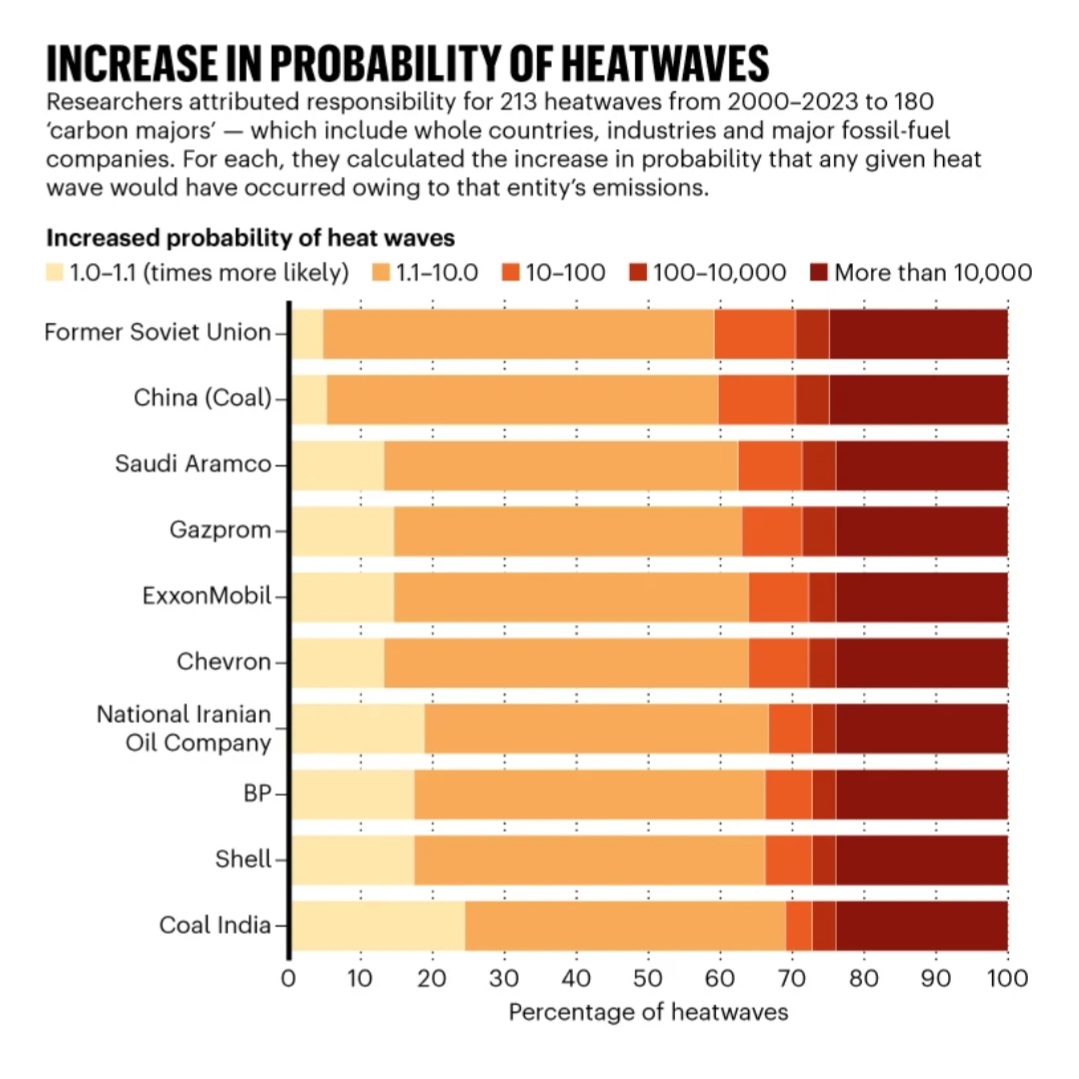Climate scientists have been attributing storms, droughts and heatwaves to global warming for two decades. Now, they are tracing the chain of responsibility all the way back to the producers of fossil fuels. A study published today in Nature shows that around one-quarter of the heatwaves recorded over 2000–23 can be directly linked to greenhouse-gas emissions from individual energy giants.
The findings could provide fresh evidence to support lawsuits seeking to hold companies accountable for their impacts on the climate.
“I cannot as a scientist assign legal responsibilities for these events,” says lead author Yann Quilcaille, a climate researcher at the Federal Institute of Technology in Zurich, Switzerland. “What I can say is that each one of these carbon majors is contributing to heatwaves, making them more intense and also making them more likely.”
More than one-quarter of the 213 events recorded would have been “virtually impossible” without human-induced global warming, the study found. The emissions linked to energy companies and other major carbon emitters increased the likelihood of some 53 heatwaves by a factor of more than 10,000.

Increase in probability of heatwaves. Graphic showing the top ten of 180 ‘carbon majors’ — which include whole countries, industries and major fossil-fuel companies - for which researchers attributed responsibility for 213 heatwaves from 2000–2023. For each, they calculated the increase in probability that any given heat wave would have occurred owing to that entity’s emissions.
This is not the first time that climate impacts have been attributed to fossil-fuel producers, but Quilcaille and his team go one step further than their predecessors and link individual companies directly to specific heatwaves. Legal experts say it’s a line of evidence that could feed into climate litigation that focuses on specific events, such as the 2021 heatwave that hammered the US Pacific Northwest in 2021. Already, a county government in Oregon has filed a US$52-billion civil lawsuit against fossil-fuel companies for contributing to that event.
“This study adds to a growing but still small literature showing it’s now possible to draw causal connections between individual emitters and the hazards from climate change,” says Christopher Callahan, an Earth-system scientist at Indiana University in Bloomington, who has linked economic impacts of rising temperatures to fossil-fuel producers2. What to do with that information will be up to judges, juries, courts and politicians, he adds.
Major emissions
Quilcaille and his colleagues started by assessing the historical greenhouse-gas emissions from 180 ‘carbon majors’, which include many of the largest energy corporations, as well as state-owned entities such as Saudi Arabia’s Saudi Aramco and Russia’s Gazprom (neither company responded to Nature’s requests for comment). They also tallied up the emissions from the production of cement and coal in countries such as India and China. Together, these entities account for nearly 57% of historical emissions around the globe, the study found.
The team used climate models to analyse global temperature trends in a world with and without greenhouse gases. It then assessed the probable impact of human-induced global warming on heatwaves recorded around the planet and attributed these to the greenhouse-gas emissions tied to each of the carbon majors (see ‘Increase in probability of heatwaves‘).
“It’s a systematic approach to attribution which brings us to the next level in creating a chain of causality,” says Karsten Haustein, a climate scientist at the University of Leipzig in Germany. “We absolutely can allocate blame, and we absolutely should.”
Despite the eye-popping estimates for responsibilities allocated to individual carbon majors, the uncertainties remain high in many instances, in large part because the most extreme heatwaves are statistically rare. For example, Quilcaille’s central estimate suggests that ExxonMobil’s emissions increased the probability of the 2021 heatwave in the Pacific Northwest by a factor of more 10,000. At the lower bound of this range, however, the company increased the probability of the heatwave by just 19%, which represents a “bare minimum,” Quilcaille says. ExxonMobil did not respond to a request for comment from Nature’s news team.
Legal questions
The results will contribute to a much-needed public conversation about responsibility for climate damages, says Jessica Wentz, a legal scholar at Columbia University’s Sabin Center for Climate Change Law who is based in Santa Rosa, California. The research could also directly influence dozens of ongoing lawsuits against fossil-fuel producers, but science is just one of many factors in play in those cases.
One legal question, for example, is whether and to what extent it makes sense to hold energy companies responsible for climate change. After all, they are sanctioned under national and international laws, often subsidized by governments, and it’s their customers who are the ones actually burning the fossil fuels and emitting greenhouse gases.
Why farmers are beginning to take their government to court over climate change
Wentz says most of the more than two dozen active lawsuits in the United States argue that fossil-fuel companies, like tobacco producers decades ago, knew about the dangers that their products posed and have actively sought to undermine both the science and the government policies that would have prevented those harms. “They misled the public: that’s the basis for establishing liability,” she says.
The same argument plays into how scientists are running the numbers. “There is a wealth of evidence now that major fossil-fuel producers were aware of climate change before the rest of the public was and used their power and profit to undermine climate action and discredit climate science,” says Callahan. It’s therefore “morally appropriate” to hold those companies accountable for the emissions of the products they sell, Callahan adds. “That is a choice we are making, and we are explicit about that choice.”
Nature also reached out to the following companies for comment on the study’s findings but did not receive a response: BP, Shell, Chevron, National Iranian Oil Company and Coal India.
Nature

